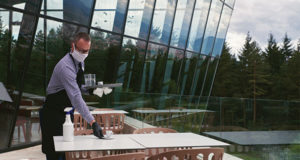How to reduce hazards for aged care residents with dementia
Tuesday, April 17, 2018 Care
There are more than 400,000 Australians with dementia, according to Alzheimers Australia, and a staggering 1.2 million people involved in their care.
Looking after someone with dementia requires skill and experience. You need a firm understanding of how to support this person, effectively manage their pain and perhaps most importantly, create a safe, yet independent and home-like environment.
Here's how to foster this kind of space in your aged care facility.
Around 250 people develop #dementia each day, according to new data from @DementiaAus
READ MORE: https://t.co/8eGwT72nCM pic.twitter.com/ez3aVG21Kb— The Senior (@SeniorNewspaper) February 28, 2018
Assessing the environment of a person with dementia
When it comes to preparing a home for a person with dementia, you need to constantly assess and change the situation as required.
Dementia affects everyone differently, which is why caregivers should never enact blanket policies or standard modifications. While some residents may exhibit confusion or memory loss, for example, others may be more prone to issues with mobility and coordination. It's essential for those maintaining residents' physical environment to consider the person they're looking after when assessing modifications.
Here are some guidelines:
- Involve the person with dementia in identifying potential hazards,
- Respond to specific issues with specific solutions,
- Try to change as little as possible,
- Keep solutions as simple as possible,
- Aim for a balance between freedom and security.
Architect selected for Australia's first dementia village https://t.co/JtyXybChW3 pic.twitter.com/uUoOIrg6AF
— Aged Care Insite (@AgedCareInsite) December 20, 2017
Tips for a safe, independent environment
While you should always tailor your solution to the person and the behaviour at hand, there are general tips for creating a hazard-free living space.
Arrange furniture simply and consistently
To avoid slips and falls, place furniture in a clear, uncluttered layout. Once a good pattern is set, avoid changing it. Moved items can become obstacles for those with dementia.
Install safety switches
If residents have any form of appliance – including small items like a tea kettle or coffee machine – install safety switches that cut off automatically
Avoid the use of long cords
Replace long cords with coiled or retractable alternatives. Better yet, avoid this hazard altogether by opting for cordless items instead.
At ACW Care, we always purchase state of the art aged care cleaning equipment, such as cordless, hypo-allergenic vacuum cleaners.
Reduce the temperature of hot water sources
Using the thermostat, ensure the maximum water temperature is safe and comfortable. People with dementia may not be as able to sense when the water in the tap could burn them.
Train staff in working with people with dementia
Many people with dementia and their families choose residential aged care faculties due to the volume and variety of caregivers.
In a nursing home, there's never just one person involved. Practitioners, room attendants, nurses, professional aged care cleaners and other staff members all play a part in keeping residents safe.
That's why it's essential everyone in your facility is adequately trained in creating a safe environment for those living with dementia. When you work with ACW Care, you can rest assured that every cleaner on site has training and experience in working with the elderly, as well as manual handling and helping seniors should they trip and fall.
To find out more about how we can optimise the cleaning of your aged care site, reach out to our team today.




